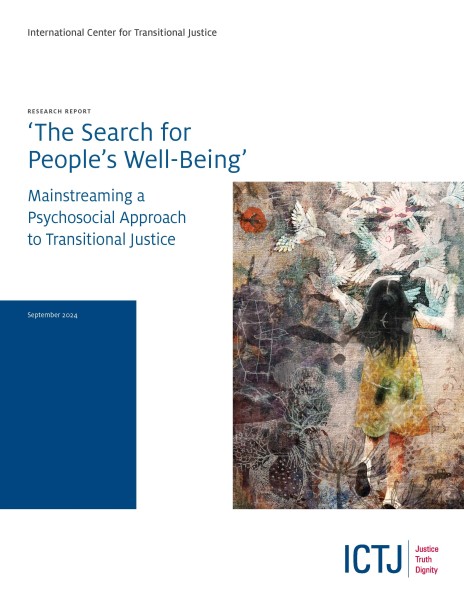We work side by side with victims to obtain acknowledgment and redress for massive human rights violations, hold those responsible to account, reform and build democratic institutions, and prevent the recurrence of violence or repression.
‘The Search for People’s Well-Being’: Mainstreaming a Psychosocial Approach to Transitional Justice
The field of transitional justice is increasingly recognizing the relevance of mental health and psychosocial support (MHPSS) in contexts of massive human rights violations. Despite growing advocacy and awareness at the global policy level, however, the field lacks a systematic approach to the issue. This study contributes to the development of such an approach, one that applies a psychosocial lens to analyze contexts, assess needs, and design and implement programming that has a positive impact on the well-being of victims and communities and broader social systems.

The field of transitional justice is increasingly recognizing the relevance of mental health and psychosocial support (MHPSS) in contexts of massive human rights violations. Despite growing advocacy and awareness at the global policy level, however, the field lacks a systematic approach to the issue, signified by the persistent conception of MHPSS solely as a form of service provision to victims and survivors. This study contributes to the development of such an approach, one that applies a psychosocial lens to analyze contexts, assess needs, and design and implement programming that has a positive, transformative impact on the well-being of victims and communities, as well as broader social systems. Drawing on experiences in contexts such as Australia, Canada, Colombia, The Gambia, Nepal, Uganda, and Syria, the report also offers guidance for supporting the mental health and well-being of transitional justice practitioners and addresses practical considerations as they operationalize MHPSS within their own work.
At the level of formal transitional justice processes, a psychosocial approach can be integrated into reparative justice, truth-telling initiatives, and judicial processes seeking criminal accountability. Beyond formal processes, though, a psychosocial lens should be a foundational component of all aspects of transitional justice work. It requires a deep understanding of context and the psychosocial needs of a given society, community, or group. It also requires the development of responses that address those needs across different interventions. This study therefore offers guidance regarding key points of consideration for both civil society and government actors involved in transitional justice: embedding work in local communities, creating conditions for positive participation, overcoming stigma, identifying clear roles, building collaboration across silos, developing a long-term process, focusing on all stages of work, considering trauma among leaders and institutions, securing adequate funding, and measuring progress. The report argues that a psychosocial approach needs to be outward to inform analysis of the overall context, design of the intervention, and support for victims, as well as inward to consider how trauma affects organizational structures, team dynamics, and individuals’ ability to do their work.